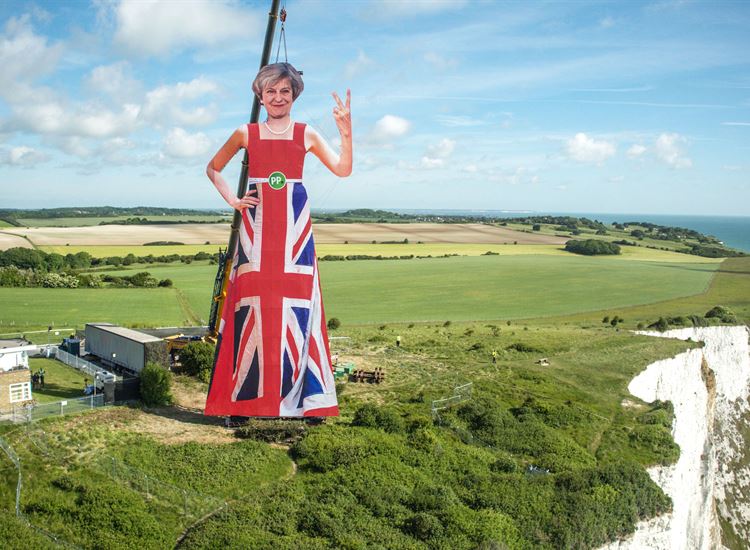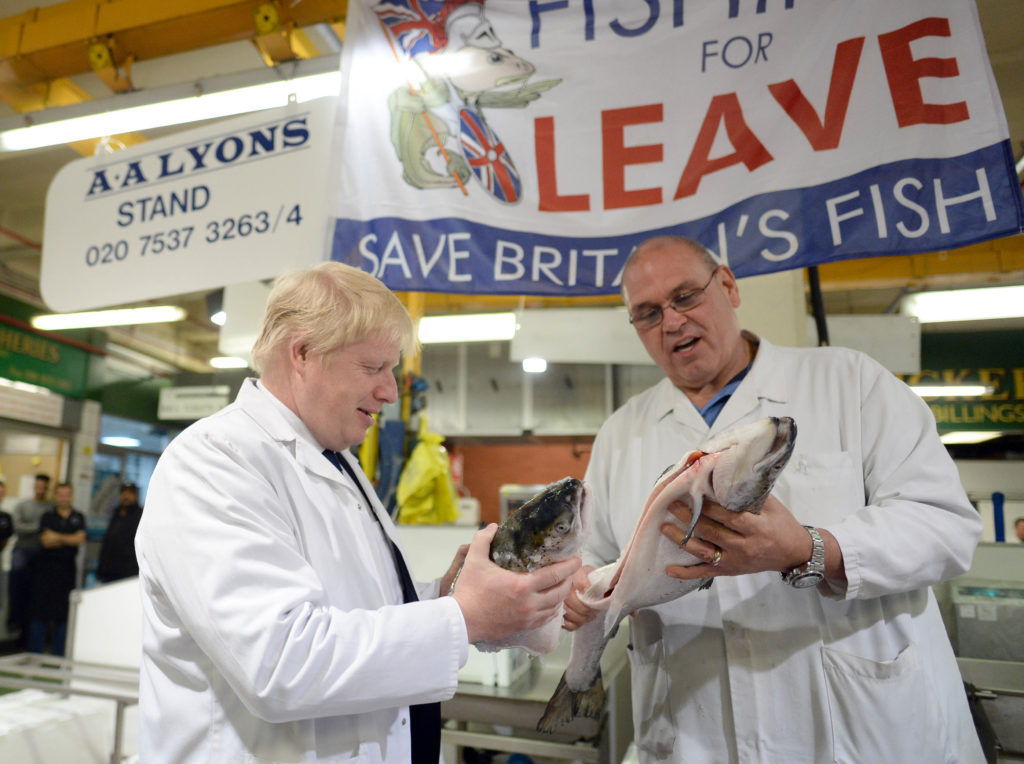The Breakup of Britain
It’s a thorny old cliché that Scotland couldn’t manage the breakup of Britain by itself. Brexit has ushered in the conditions where England can now do a lot of the heavy lifting. As we (rightly) worry about food shortages, reckless deregulation and logistic chaos, we shouldn’t lose sight of the shifting constitutional crisis and the long-term damage that’s being done to the very stability of Britain.
This is a combined result of the new Tory mindset, shorn of the pretence of paternalism and embittered in its glorious new nationalism. It’s a potent mix of decline and menace which brings the normalisation of food bank culture and leads seamlessly to Priti Patel suggesting we threaten Ireland with food shortages to break a better Brexit deal.
It’s not ahistorical it’s a particular historical approach which shows continuity with a certain thread of British politics.
It’s in this social and international context that Open Democracy notes “The Brexit disaster is an existential crisis in the ‘Idea’ of Britain”.
Gerry Hassan writes: “The reasons for Brexit lie much deeper in part of the English psyche …The last two and a half years have revealed unattractive things about the English political imagination. First, there has been the ridiculous language of Tory Brexiteers like Jacob Rees-Mogg, Steve Baker, Nadine Dorries and Boris Johnson. They have talked of the UK as a ‘vassal state’ and a ‘colony’ permanently stuck in ‘servitude’, while comparing the EU to Napoleon, the Soviet Union, and of course, Nazi Germany.”
If economic decline and precarity are key drivers to Brexit and the rise of English nationalism, the focus on Ireland and the open contempt for the Celtic nations are not accidental outcomes.
As Mark Hutchinson writes in the Irish Times: “There is a deep sense of irony in that it is England’s own decision to now leave the European Union, and recover a supposedly independent global presence, that has finally exposed how little may now be left of Britishness in the 21st century. The term British was first used by James I and VI, when, as King of Scotland, he ascended the thrones of England and Ireland in 1603. But such an identity did not find the sort of dominant cultural presence we might expect in either Scotland or England. They remained separate kingdoms until the Act of Union of 1707.”
He continues: “… the Ulster Plantation was the first real British policy because it involved both the Scots and the English working together. In fact, Ulster established the framework which has continued to define British identity in that Britishness had meaning, not within the geographical confines of the actual island of Britain, but in Ulster which sat outside its boundaries.”
“Being “British” co-opted Scotland into England’s long-running involvement with Ireland, which was now justified under the labels of British “civility” and Protestantism, as opposed to something particularly English.”
Lose Northern Ireland and you lose Britain.


England may see this process as “liberating itself from Europe” but it will be “liberating itself” from the Union too.
Patrick Cockburn at the Independent makes the same connections:
“It is worth recalling the degree to which British politics was divided and poisoned by fierce disputes over Irish independence for the whole of the nineteenth century and early twentieth century, right up to the moment that Ireland achieved self-determination in 1921. What used to be called “the Irish Question” has now been reborn as an all-consuming issue by “the Scottish Question” and, whatever the timing and outcome of a second Scottish referendum, it is not going to go away. Supposing that Theresa May really believes, as her patronising rejection of another poll in Scotland might suggest, that “the Scottish Question” can be indefinitely delayed, then she will be joining a long dismal list of British leaders down the centuries who made the same mistake about Ireland.”
Cockburn concludes:
“Brexit is English nationalism made flesh, but the English underrate its destructive potential as a form of communal identity. Concepts like “nationalism” and “self-determination” have traditionally been seen as something that happens to foreigners. An English failing today is an inability to recognise the egocentricity implicit in such nationalism and the extent to which it alienates and invites confrontation with other nations in the British Isles and beyond.”
Taking Back Control
This form of self-blindness is a cultural trait that England will need to transcend.
But this will be difficult when the political debate is so mired in myth and with such intense self-deception at play.
As Hassan observes:
“If Brexit had really been about ‘Taking Back Control’ then the 2016 vote would have resulted in a flurry of proposals for greater democratisation in the UK: to reform Parliament, to more effectively hold the Executive to account, in how laws were made, and about decentralising one of the most centralised countries in the developed world. They could even have begun thinking about England – the state of which fed Brexit.”
Perhaps that is a remote and grim possibility, that England can salvage itself out of the prospective No Deal wasteland and reform its own institutions and self-identity out of the wreckage of an abandoned Britain?
But that would require the nascent English nationalism to be retrieved from the far-right and the Brexit project to be taken back from being a vainglorious notion of global exceptionalism and instead create a restorative project in times of crisis.
This seems unlikely.
Particularly as the trajectory of the Brexit crisis seems to point inexorably to the breakup of Britain.
How could England be re-born out of the deconstruction of Britain?
Perhaps because the elites that run and rule England draw power and status from being British. It’s through the Union that power is sustained and projected. The sinews of the landowning class and the cultural projection through imperialism is core to elite power.
But this vision of a retrieval of English nationalism has to contend with other forces at play.


Ecological crisis and lurching economic and political uncertainty go hand in hand as the psychological trauma of climate breakdown meets with the failure of market economics.
This is explicitly recognised by the recent IPCC report and the reality is only now sinking in.
As Troy Vitesse remarks in the Boston Review:
“the IPCC concedes that environmental policy based on “market mechanisms” has failed, deducing that there must be a return to direct governmental regulation. The report is written in dull bureaucratic prose—and it pays obeisance to powerful interests in government and business—but buried underneath the leaden jargon is a revolutionary document.”
How does this relate to English constitutional politics?
As UKIP’s new ambassador Tommy Robinson takes to the streets to try to trade on the Yellow Vest energy – this week has seen UKIP become too toxic even for David Coburn, Nathan Gill and Paul Nuttall, you can see that there is potential for English nationalism to take a turn further to the right, not be retrieved by the left.
As systems fail and authoritarian politics rise, as extreme inequality accentuates already stark class divisions, as ecological breakdown creates climate immigration, the elements of fear and chaos are likely to thrive.
We are already in powder keg of xenophobia in Britain in which the simplistic populism of blame-culture has been cultivated for years. The country doesn’t need Calais-Dover to seize up to provide food shortages, people are already suffering food poverty. The problem is what kind of politics thrives under these conditions?
We are at a crossroads where democratic reform, ecological ‘new deal’ economics and forward-facing constitutional change could be part of a new future, or a further breakdown into domination by right-wing forces is seen on the streets and in the benches of government as socio-ecological decline takes hold.


I watched the Ealing Studios film The Ship that Died of Shame (1955) on Talking Pictures today. The ship in question is a motor torpedo boat bought as postwar navy surplus by members of its old (traumatised, discarded, avaricious) WW2 crew, who put it to increasingly criminal use, smuggling across the channel. In a somewhat mystical metaphor, the boat starts breaking down as the cargo gets more vile.
There’s aspects of the movie that reflects postwar UK attitudes to Europe, to notions of honour and its trappings, and what seemed virtues in wartime (like loyalty and dependability) can be corrupted by making a fast buck (to hell with constraints, regulations and eventually all sense of justice).
In the UK, the Ship of State is in similar waters. Like MTB 1087, now obsolete, it serves a purpose it was never designed for, and is buckling, perhaps bucking, under the strain. Down in the engine room of its civil service, its human components mesh and grind, while on deck the party is still going on. The sinking in comes later. Or perhaps sooner. The gunboats of diplomacy are coming home to rust. The British looted the continent tenfold as much as the Nazis by some reckonings. The rock awaits.
Patel’s proposed strategy of threatening Ireland with food shortages exposes the absolutely base sentiment that courses in the blood of the Toriy elite who run Britain. It. Is the policy of hate, the policy of intimidation, the policy of force, and it is a policy that rarely, if ever works.
Hate breed hate and. hate kills. The Famine in Ireland is testimony to that. Indeed with over two million dead in 1943 in British India due to another imperial instigated shortage Patel shoild be more than aware.
But what this new found aspiring elite does not understand is that like the colonials sorely oppressed, she too could easily fall prey to the dark thinking. The colour of her skin, the heritage of her name, could well see to that, because to many in her new found Tory party she will be nothing more than the token Uncle Tom.
That is how the British elite think. It is how they operate, and Patel is but a fool in trying to think she can ever be the same. Her colour, her name, mark her out for that just as being as being poor, or sick identifies people for the hostile environment. Windrush could I’m sure be applied to her and her ilk and she Is a fool not to recognise it.
Gold star, a striped sari, and a spell in Dungavel for Patel if she is not careful.
“… a policy that rarely if ever works.”
Dunno, mate. 400 years is a jolly good innings.
A month before BrexitRef I was with a group of middle-Englanders – all nice, mannerly, likeable individuals – along with a couple of other Europeans. Inevitably, the conversation turned to how ‘we’ valiantly won the war, how the Empire was all about providing trains and hospitals, etc. The Europeans clearly got the dry boak as bad as me, grimaced but said nothing. I choked down the urge to explain how the Brits are empirically the most offensive people in human history. As Ibsen said, ‘if you take away somebody’s life lie, you take away their happiness’. Nobody had the heart to tell them – it would be like telling a wee boy what he knows deep down, that his superman costume won’t make him fly.
Sadly for everyone else, England’s defenses against reality are so vital to the culture that they’ll withstand the hardest and most humiliating Brexit imaginable. Luckily for Ms Patel, support and emulation from people of varied backgrounds bolsters the delusion that England is always entitled and always right to be entitled. Priti will be just fine.
In the meantime, Scotland better back out of this asylum, as quickly and quietly as we can.
I don’t think England will ever transcend the negative forces given head by Brexit. The idea of English/British exceptionalism and “manifest destiny” are too ingrained in the “British” psyche. All our lives after Brexit will be diminished, including those who thought it would bring salvation from imagined tyranny. But the lies, delusion and denial will always see “the other” blamed instead of “ourselves” with all the negative and ugly subsequencies that will inevitably entail. Brexit Britain will be a grim, ugly place. It’s time for inclusive, outward-looking and positive Scottish “civic nationalism” to take to the stage again and give us real hope for a brighter future.
‘Lose Northern Ireland and you lose Britain’.
Constitutionally this would seen an accurate statement given that May’s current Brexit proposals inclusive of the NI ‘backstop’ clearly represent a major violation of the Treaty of Union. Perhaps the SNP MP’s should vote for May’s deal after all as it appears to make void the Treaty of Union?
Treaty of Union 1707 ARTICLE VI. Regulations of Trade, Duties, &c.
“That all parts of the United Kingdom for ever from and after the Union shall have the same Allowances Encouragements and Drawbacks and be under the same prohibitions restrictions and regulations of Trade and liable to the same Customs and Duties on Import and Export And that the Allowances Encouragements and Drawbacks prohibitions restrictions and regulations of Trade and the Customs and Duties on Import and Export settled in England when the Union commences shall from and after the Union take place throughout the whole United Kingdom”
Hi, Mr Baird, this is just the latest breach of the terms of the Treaty – each and e very one broken unilaterally by Westminster on behalf of England.
This Thursday 14th December 2018 is the one hundred year centenary of the 1918 general election where in Ireland SF secured 46.9% of the vote and 73 out of 105 Irish MPs. On the basis of this majority SF walked out and declared Dail Eireiann.
Thursday 7th May 2015 in Scotland the SNP secured 50% of the vote and 56 out of 59 Scottish MPs. On the basis of this Scotland is now having powers removed from its Parliament and is being pulled out of the EU against its democratic will.
On 10th 1998 the British and Irish governments signed the Good Friday Agreement.
Two decades later the NI Assembly is suspended and the GFA is in tatters as legislation is progressed to reestablish stop search and detain patrols on the ROI / NI ( and U.K. sea ports ) border.
Now what does history tell us?
This is excellent stuff, Mr Small, and to the point. Now, is it not time that someone with a bit of guts admitted that, given that English mindset (and even the Remainers, many of them, also have it) is nationalist, for the most part, and nothing wrong with that when you are looking after yourself. What is less – far less – acceptable is that English Nationalism when others, who have nothing to deserve their maltreatment, are dragged into the stew against their will? When are we going to admit that the same English Nationalist mindset down there is also up here, and it is bolstered by a part of the NI residents’ vote against independence, too? I am well aware that many English people and many NI people positively support Scottish independence, but too many in both communities have the same mindset as their counterparts in both England and NI, and that, combined with the Scottish Unionist (actually British Nationalist, ergo English Nationalist) vote, which is the minority of born Scots, there is no way that we can gain independence this side of Armageddon? I do not believe polls. No one should. Believing them did us a great deal of harm in 2014. We have to accept that we cannot turn dyed-in-the-wool English/BritishNationalists/Unionists, and seek another route to independence.
This is a very fine piece indeed. It deftly, and eruditely, draws together strands of history, politics, ecology, pathological psychology and authorial empathy to paint a frighteningly vivid picture of the multiple derangements that confront us.
Their common ontology lies in the concentrations of wealth and power that drove subjugation, land theft, imperialism, militarism and their links through capitalism and its present neoliberal-catastrophic stage.
If it were not for the opportunity to begin to deflate this awful social wen by puncturing the chancre of “Britishness’ from which the local manifestation of the disorder emanates, there would be nothing but despair.
But as so correctly identified – this diagnosis provides our opportunity for a healthy outcome. Scotland’s independence would end the British state – and that is the necessary, if not sufficient, precondition to bring about recovery.
England is embarking a long, lonely cure for her fatal delusions. As neighbours we can only hope that she survives and eventually recovers – but there is no guarantee.
But amputation is the only means available to Scotland to ensure that the corruption does not spread any further.
Scotland can be a beacon and will contribute to international peace and sanity, but only if we can be ourselves.
Removing all Tory (Britnat) control over any aspect of Scottish society will just be the beginning.
Else we rot with them.